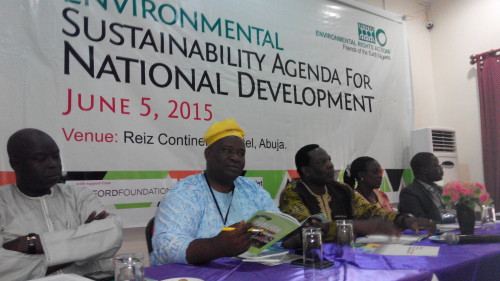Environmental activists have underlined the need for a strong national institution that will provide leadership, coordination and create access to information to fully respond to the immediate and future challenges posed by climate change. In this regard, they called for the passage and implementation of the National Climate Change Commission/Agency which stagnated in the seventh National Assembly waiting for Presidential signature.

At a recent forum in Abuja on 5th June 2015 to commemorate the World Environment Day (WED) courtesy of the Environmental Rights Action (ERA)/Friends of the Earth Nigeria (FoEN), participants clamoured a shift from fossil fuel-based energy sources to cleaner energy options such as solar and mini-dams. According to them, the provision of reliable, clean, affordable energy access is required to create economic opportunities especially in the rural areas where there is need to grow Small and Medium Enterprises (SMEs).
Similarly, at forum on “Environmental Sustainability Agenda for National Development”, the activists called for the passage of the Petroleum Industry Bill (PIB) which, according to them, will guarantee the unbundling of the Nigeria National Petroleum Corporation (NNPC) and transparency and accountability in the oil sector. They recommended metering at the point of extraction of the country’s oil to check oil theft and shore up oil revenues.
The gathering likewise recommended the immediate implementation of the United Nations Environment Programme (UNEP) report on Ogoniland, adding that oil companies should be required to contribute an initial amount of $100 billion to address the issues raised in the UNEP report, in particular, restoration of the degraded environment.
Participants also underscored the need for a National Basic Income Scheme (NaBIS) to cater for the unemployed and aged that suffer social exclusion and livelihood losses from environmental degradation. A social security scheme initiative of N10,000 monthly, they reasoned, would unlock creative potentials and create social cohesion while building citizen’s morale.
Participants at the daylong event were drawn from community campaigners from across Nigeria, civil society groups, lawyers, labour unions, the academia, and the media among others, who brainstormed on the state of the Nigerian environment with a view to charting the way forward.
The gathering served as a platform for ERA/FoEN to present a roadmap to the Muhammadu Buhari government in form of a memo on how to tackle the myriad of environmental challenges and social exclusion of majority of Nigerians as part of the administrations “change” agenda.
In the course of the meeting participants made the following observations:
- Even with Nigeria’s much-touted commitment to the United Nations Framework Convention on Climate Change (UNFCCC), the country is yet to set up a National Climate Change Commission and unveil any credible roadmap to tackle climate change phenomenon.
- Environmental degradation continues to expand from northern Nigeria where desertification is ravaging 11 states, to the east that suffers from gulley erosion, and the south and west that suffer deforestation and unmitigated oil pollution respectively.
- Nigeria still relies heavily on oil and gas resources to the detriment of renewable sources of energy
- The extractive industry, particularly those operating in the Niger Delta, have institutionalised disdain for the environment due to their imperious influence on the Nigerian government.
- Nigerians still do not know exactly how much oil is extracted vis-à-vis volumes sold from the export terminals. Oil extraction and export is still fraught with theft as the oil companies continue to challenge metering at the point of extraction and at the export terminals
- Four years after its release, the Federal Government is yet to instigate or demonstrate the political will to implement the recommendations of the UNEP report on Ogoniland
- Social exclusion in the Nigerian polity continues to grow, creating discontent and a recourse to militancy and terrorism in various parts of the country.
